Surfing the SAFE Wave: How Thailand's Startups Are Riding High
SAFE agreement Thailand startups Southeast Asia 6 minutes
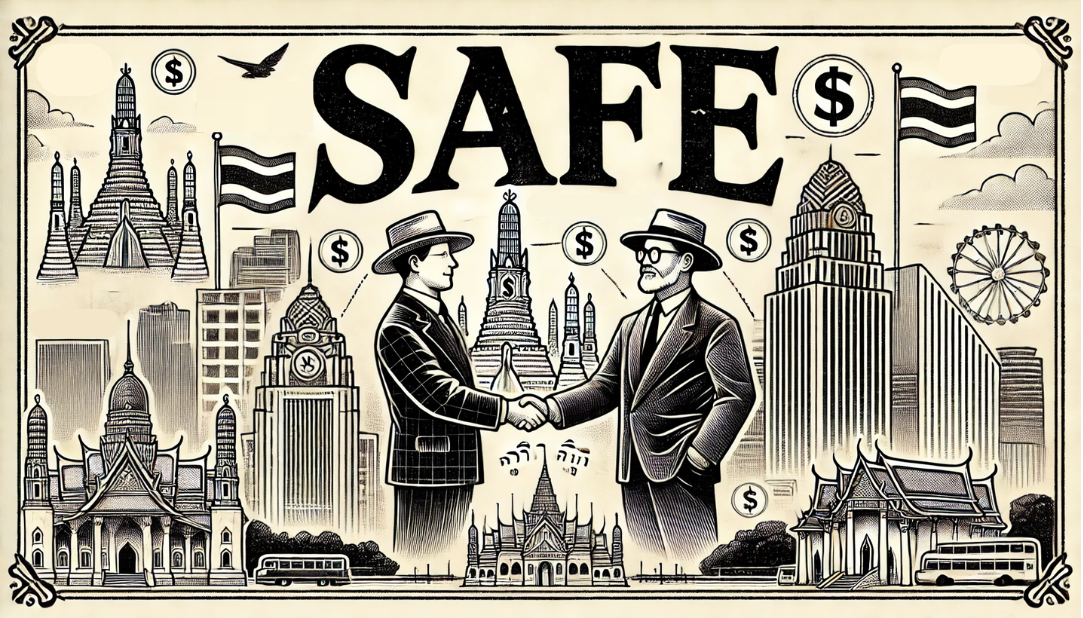
In the ever-evolving world of startup financing, Southeast Asia, particularly Thailand, is no stranger to innovative funding mechanisms. Among these, the SAFE (Simple Agreement for Future Equity) has emerged as a potent tool for startups looking to raise early-stage capital. Originally designed by Y Combinator, the SAFE is a streamlined alternative to the more cumbersome convertible note, offering a quicker and more flexible way to secure funding. But how does this Silicon Valley export hold up in the intricate legal and economic landscape of Thailand?
What is a SAFE?
A SAFE is essentially a promise between a startup and an investor: the investor provides capital now, with the promise of equity in the future, typically during the next significant financing round. Unlike convertible notes, SAFEs do not accrue interest, nor do they have a maturity date, making them less burdensome for fledgling companies. They’re simple, efficient, and have gained significant traction in global startup ecosystems.
However, the legal landscape in Thailand presents unique challenges. The country’s Civil and Commercial Code (CCC) does not explicitly accommodate SAFEs, particularly when it comes to issuing convertible shares or options for future shares. This means that while SAFEs can be utilized, they require a bit of legal maneuvering to align with Thai law, often involving indirect mechanisms or creative legal structuring (KrASIA).
How Are SAFEs Being Used in Thailand?
Despite these legal complexities, SAFEs have found their footing in Thailand’s burgeoning startup scene. Startups here are increasingly turning to SAFEs as a way to attract early-stage investors without the immediate complications of equity dilution or debt repayment. This is particularly appealing in a market where early-stage funding is competitive, and startups need to move quickly to secure capital.
For instance, in 2023, Thai-based tech startups like ZTRUS and FinVest raised seed funding through SAFEs, allowing them to bypass the lengthy negotiations often associated with equity financing. These SAFEs were structured with valuation caps and discount rates that provided early investors with the potential for significant upside, while also giving startups the flexibility they needed to scale rapidly (Business News Asia).
The Appeal and Risks of SAFEs
SAFEs in Thailand offer several advantages, particularly their simplicity and the speed at which they can be executed. For startups, they provide a way to raise funds without immediately giving away equity or taking on debt. For investors, they offer a path to equity in promising startups, often at a favorable discount.
But it’s not all smooth sailing. One of the key risks associated with SAFEs is the lack of guaranteed returns. If a startup fails to reach a triggering event, such as a Series A round or an acquisition, investors may find themselves holding a worthless agreement. This risk is particularly pronounced in Thailand, where the startup ecosystem, while growing, is still maturing and not all ventures reach the scaling stages that trigger SAFE conversions (e27).
Navigating the Legal Landscape
Given the Thai CCC’s restrictions on issuing convertible shares, SAFEs in Thailand often require a creative approach. Legal experts recommend structuring SAFEs to align with permissible mechanisms under Thai law, such as linking the SAFE to an increase in the company’s registered capital or issuing preference shares. This ensures that the agreement remains enforceable while still providing the benefits of a SAFE (CreationsForU).
The Future of SAFEs in Thailand
As Thailand’s startup ecosystem continues to grow, the use of SAFEs is likely to increase. The flexibility and simplicity they offer are well-suited to the fast-paced world of startups, where time is often more valuable than money. However, it’s crucial for both startups and investors to understand the legal nuances and risks associated with SAFEs in Thailand.
In a landscape where innovation is key, SAFEs represent a bold, if risky, approach to funding. For the right startup, they offer a lifeline of capital that can mean the difference between scaling up or shutting down. But as with all things in the startup world, it’s a gamble—a calculated one, but a gamble nonetheless.
Final Thoughts from WOWS:
The surge in SAFE usage in Thailand is a testament to the region's adaptability and hunger for growth. As the ecosystem matures, we expect to see more creative solutions to navigate the unique challenges posed by local regulations. For now, SAFEs offer a beacon of hope for startups looking to scale quickly, but as always, tread carefully and stay informed.
Sources:
Ready to Learn More About SAFE Notes?
At WOWS Global, we specialize in helping startups simplify their funding process through customized SAFE notes. Our team provides expert guidance, legal compliance, and personalized support to ensure your investment agreements are founder-friendly and investor-ready.
To find out more, visit our SAFE Note page or schedule a no-obligation chat with one of our experts today to discuss how we can assist with your startup's funding needs.
Related Posts
-

Retail Investors AI Startups Southeast Asia 4 Minutes
Polarlyst: The Thai AI “Co-Pilot” Bringing Institutional-Style Research to Retail Investors
Polarlyst is a Thai AI-driven investing “co-pilot” turning complex financial data into clear, actionable insights for retail investors. In this WOWS Global spotlight, we break down why they stand out, why they’re worth watching, and what their rise says about the next wave of WealthTech in Southeast Asia. -
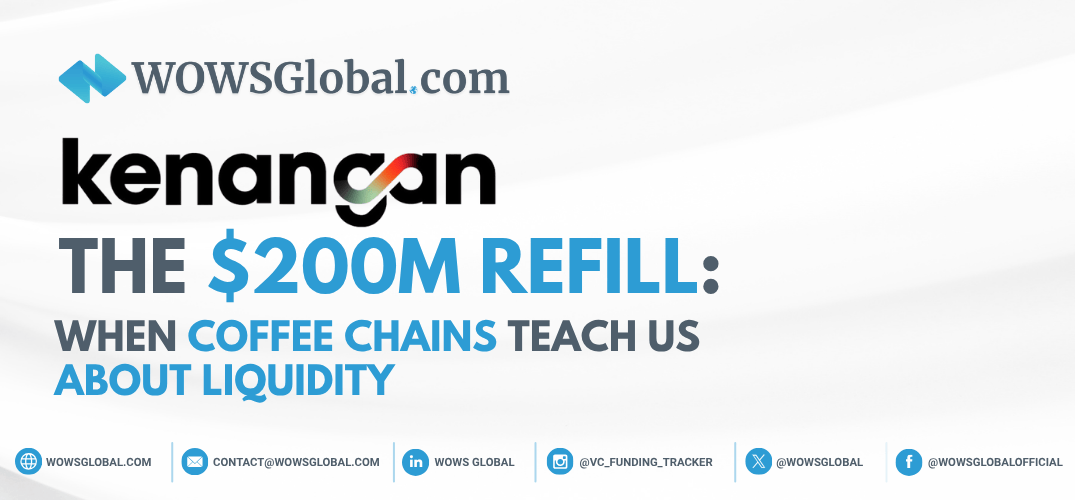
Cap Table SEA AI Startups Southeast Asia 5 Minutes
The $200M Refill: When Coffee Chains Teach Us About Liquidity
A closer look at Kopi Kenangan’s USD 200M hybrid round—and why mid-journey liquidity, valuation discipline, and payout clarity matter. We break down the mechanics, the incentives, and the playbook for both founders and investors. -

Southeast Asia Healthcare hospitality tech SEA 4 Minutes
Huray: The Insurer-Integrated Chronic Care Platform to Watch
Huray builds payer-integrated digital programs for chronic diseases, combining connected devices, coaching, and clinician-backed pathways. With distribution through major insurers and a focus on measurable outcomes, the company is poised to scale across Asia’s rapidly evolving health-care landscape. -
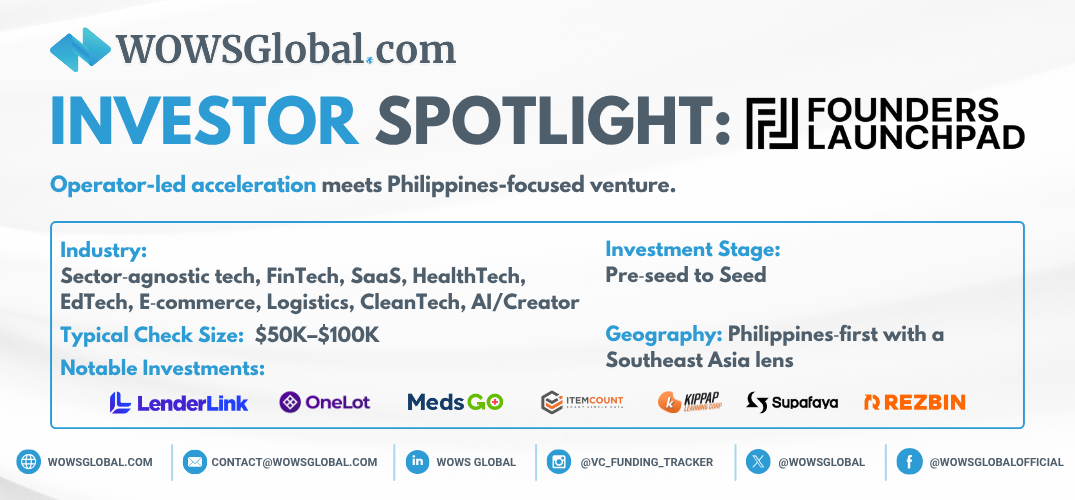
SaaS HealthTech Southeast Asia SEA Fintech 6 Minutes
Founders Launchpad: Accelerating the Philippines’ next wave of startups
Founders Launchpad blends capital with hands-on operating support to turn early insights into traction. See why investors are watching this PH pre-seed powerhouse. -
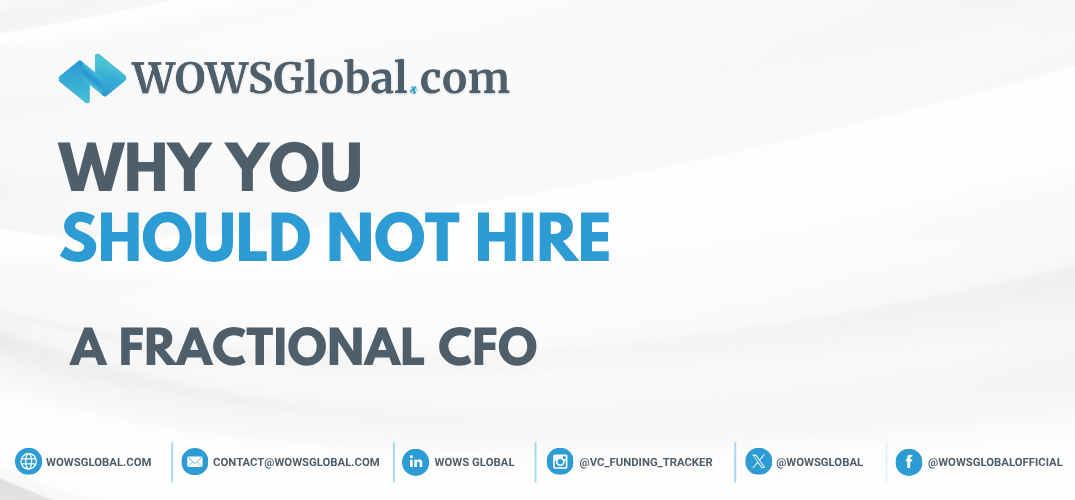
CFO Fractional CFO Southeast Asia SEA Cashflow 4 Minutes
Why You Should Not Hire a Fractional CFO
Fractional CFOs can transform a business, but only if founders are engaged, open to challenge, and aiming for scale. This piece breaks down when not to hire one, and outlines how to partner effectively when you do, from strategic involvement and driver-based models to cash discipline and investor-ready reporting. -
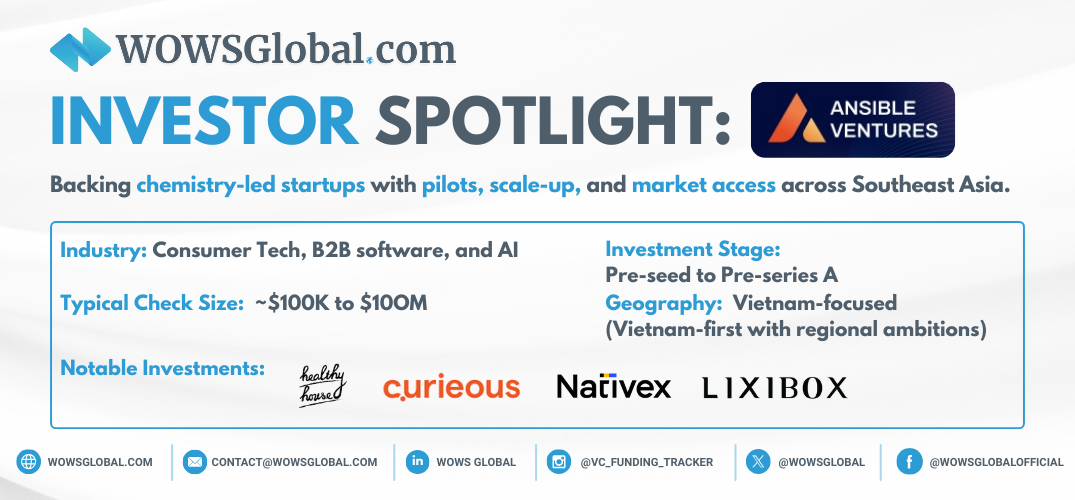
VC SEA Startups Southeast Asia Early Stage 5 Minutes
Ansible Ventures: Backing Vietnam’s Next Generation of Builders
Ansible Ventures is a Vietnam-first, early-stage VC backing software-first founders at pre-seed to pre-Series A. See their thesis, notable bets, and how WOWS can connect you via warm, qualified introductions.
